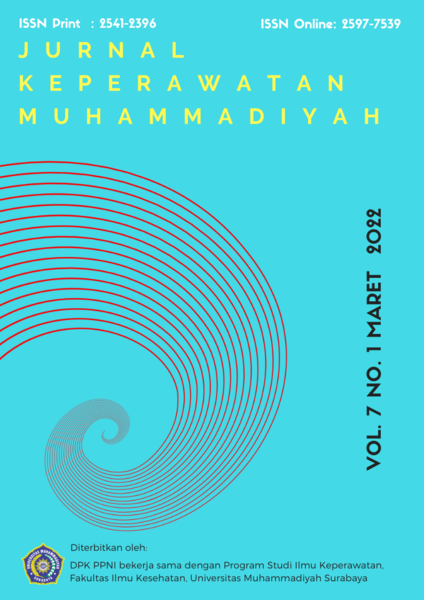Terapi Meditasi (Dzikir) Untuk Mengurangi Stres Pada Perempuan dengan Kasus Onkologi
DOI:
https://doi.org/10.30651/jkm.v7i1.17399Keywords:
dhikr, meditation therapy, oncology, stressAbstract
Objective: The primary cancer treatment may include surgery, radiotherapy, chemotherapy and hormone therapy. Surgery aims to remove the cancerous mass and correct any complications that may occur. Undergoing surgery will cause stress to the patient both psychologically and physiologically. Stress and anxiety are caused by the patient's perception of the operating room as a foreign and threatening environment, s separation from family members and friends, and the possibility of a bad prognosis that can affect the patient's future. An excellent emotional management strategy is expected to improve individuals' subjective well-being so that they can achieve peace of mind such as gratitude, patience, love of Allah, and expecting Allah's reward by doing meditation therapy in the form of dhikr. This study aimed to determine the effect of dhikr meditation therapy on reducing stress levels in women with oncology cases.
Methods: This study used a pre-experimental design with a one-group pretest-posttest design. This research was conducted by giving pre-test and post-test before and after the dhikr intervention. The population in this study were all women oncology cases at the Haji Hospital, East Java Province, Surabaya, using purposive sampling, a technique so that a total sample of 15 people was obtained. This study was conducted on January 2022. Two data collection instruments’ names lent any of the instrument respondents to assess women's stress levels with oncology cases. Furthermore, the data were analysed univariate and bivariate with paired t-test results. Kolmogorov-Smirnov’s pretest probability value of the dhikr experiment is 0.200, and the post-test of the dhikr experiment is 0.200. This indicates that the experimental group of dhikr is normally distributed. Based on the statistical test in table 4, the p-value (0.001) is obtained.
Results: Kolmogorov-Smirnov’s pretest probability value of the dhikr experiment is 0.200, and the post-test of the dhikr experiment is 0.200. This indicates that the experimental group of dhikr is normally distributed. Based on the statistical test in table 4, the p-value (0.001) is obtained.
Conclusion: There is a significant difference before and after dhikr on reducing stress levels in women with oncology cases. Midwives should consider making dhikr to treat psychological problems (especially stress) in women with oncology cases.
References
Abbas, Z., & Rehman, S. (2018). An overview of cancer treatment modalities. Neoplasm, 1, 139–157.
Agwu, K. K., & Okoye, I. J. (2007). The effect of music on the anxiety levels of patients undergoing hysterosalpingography. Radiography, 13(2), 122–125.
Anggraieni, W. N., & Subandi, S. (2014). Pengaruh terapi relaksasi zikir untuk menurunkan stres pada penderita hipertensi esensial. JIP (Jurnal Intervensi Psikologi), 6(1), 81–102.
Antoni, M. H. (2003). Stress management interventionfor women with breast cancertherapist’smanual. Totawa, NJ: Humana press inc.
Armstrong, D. K., Alvarez, R. D., Bakkum-Gamez, J. N., Barroilhet, L., Behbakht, K., Berchuck, A., Chen, L., Cristea, M., DeRosa, M., & Eisenhauer, E. L. (2021). Ovarian cancer, version 2.2020, NCCN clinical practice guidelines in oncology. Journal of the National Comprehensive Cancer Network, 19(2), 191–226.
Cacha, L. A., Poznanski, R. R., Latif, A. Z. A., & Ariff, T. M. (2019). Psychophysiology of chronic stress: An example of mind-body interaction. NeuroQuantology, 17(7), 53–63.
Gaston-Johansson, F., Haisfield-Wolfe, M. E., Reddick, B., Goldstein, N., & Lawal, T. A. (2013). The relationships among coping strategies, religious coping, and spirituality in African American women with breast cancer receiving chemotherapy. Oncology Nursing Forum, 40(2).
Hamid, A., Anwar, Z., & Fasikhah, S. S. (2012). Metode dzikir untuk mengurangi stres pada wanita single parent.
Hidayat, R., & Rifa’i, M. (2018). Etika manajemen perspektif islam.
Istiqomah, I. N. (2013). Reduced addiction in drugs abusers undergoing dhikr at Ponpes Inabah XIX Surabaya. Folia Medica Indonesiana, 49(1), 8.
Kayser, K., Feldman, B. N., Borstelmann, N. A., & Daniels, A. A. (2010). Effects of a randomized couple-based intervention on quality of life of breast cancer patients and their partners. Social Work Research, 34(1), 20–32.
Kumala, O. D., Kusprayogi, Y., & Nashori, F. (2017). Efektivitas pelatihan dzikir dalam meningkatkan ketenangan jiwa pada lansia penderita hipertensi. Psympathic: Jurnal Ilmiah Psikologi, 4(1), 55–66.
Lulu. (2002). Dzikir dan Ketenangan Jiwa: Studi pada Majelis Dzikrul Ghofilin, Cilandak, Ampera Jaya. Jurnal Tazkiya, 2.
Mardiana, L. (2007). Kanker pada wanita. Niaga Swadaya.
Momenimovahed, Z., & Salehiniya, H. (2019). Epidemiological characteristics of and risk factors for breast cancer in the world. Breast Cancer: Targets and Therapy, 11, 151.
Putri, S. B., Hamid, A. Y. S., & Priscilla, V. (2017). Karakteristik dan strategi koping dengan stres pasien kanker payudara dalam menjalani kemoterapi. Jurnal Endurance: Kajian Ilmiah Problema Kesehatan, 2(3), 303–311.
Sarenmalm, E. K., Browall, M., Persson, L., Fallâ€Dickson, J., & Gastonâ€Johansson, F. (2013). Relationship of sense of coherence to stressful events, coping strategies, health status, and quality of life in women with breast cancer. Psychoâ€oncology, 22(1), 20–27.
Sholeh, M., & Musbikin, I. (2005). Agama sebagai terapi: telaah menuju ilmu kedokteran holistik. Pustaka Pelajar.
Soliman, H., & Mohamed, S. (2013). Effects of zikr meditation and jaw relaxation on postoperative pain, anxiety and physiologic response of patients undergoing abdominal surgery. Journal of Biology, Agriculture and Healthcare, 3(2), 23–38.
Stuart, G. W. (2013). Principles and practice of psychiatric nursing (tenth). St. Louis: Elsevier Mosby.
Sugijana, R. (2017). PENGARUH DZIKIR JAHER TERHADAP STRES PADA LANSIA DENGAN HIPERTENSI. Jurnal Ilmu Keperawatan Dan Kebidanan, 9(1).
Suhaimie, M. Y. (2005). Dzikir dan Doa. Malang: Universitas Muhammadiyah Malang.
Tsamakis, K., Gavriatopoulou, M., Schizas, D., Stravodimou, A., Mougkou, A., Tsiptsios, D., Sioulas, V., Spartalis, E., Sioulas, A. D., & Tsamakis, C. (2020). Oncology during the COVID-19 pandemic: challenges, dilemmas and the psychosocial impact on cancer patients. Oncology Letters, 20(1), 441–447.
Yuan, M., Huang, L.-L., Chen, J.-H., Wu, J., & Xu, Q. (2019). The emerging treatment landscape of targeted therapy in non-small-cell lung cancer. Signal Transduction and Targeted Therapy, 4(1), 1–14.
Downloads
Published
Issue
Section
License
- Penulis tetap memegang hak atas karyanya dan memberikan hak publikasi pertama kepada jurnal ini yang secara simultan karya tersebut dilisensikan di bawah:Â Creative Commons Attribution-ShareAlike 4.0 International (CC BY-SA 4.0)













